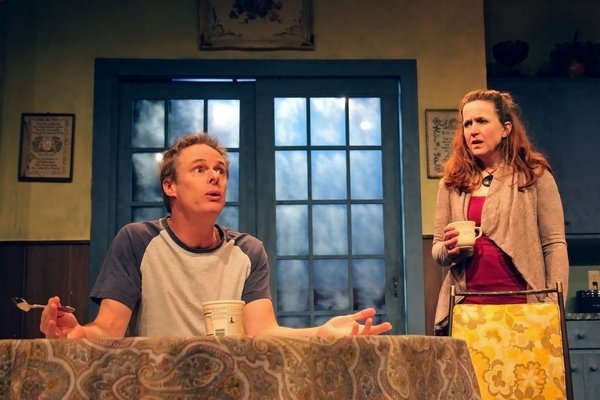
When my editor pronounced I was about to review a play that was a flop on Broadway, I grimaced. Even the title sounded foreboding: “Dead Accounts.”
But 10 minutes into the first act, I relaxed. It was obvious this production was going to be, at the very least, engaging.
By intermission, I was thoroughly charmed. Under the deft direction of Andrew Botsford, the Hampton Theatre Company is putting on a good show at the Quogue Community Hall—New York critics be damned.
Theresa Rebeck’s “Dead Accounts” knits together money, marriage and Middle America “values” versus the perception that the East merely worships at the god of mammon. This jarring intersection of East versus Midwest is infused with a generous dollop of comedy: a serious story with a vivid sense of humor.
Here, you don’t even hate the bad guy, a nervous New York banker who’s surprisingly shown up at home in the Midwest, supposedly the epicenter of bedrock American values. What he’s doing there makes up the story—and other than note it has to do with “dead accounts” in banking, I will say no more.
John Carlin as the hyperactive refugee from the East makes the character not only understandable, but even sympathetic and likeable. A lesser talent might have chewed the scenery and made him merely the cutout character of a thieving Manhattan banker, but Mr. Carlin’s standout performance turns him into someone you end up rooting for. Here he ably conveys the character’s frailty as he gropes his way through what his life is yet to be. You want him to find his way.
Besides, how much love do we have for the banking industry—as his country mouse sister point outs—that connive and fiddle with our savings while no one goes to jail and the foreclosure signs go up? Not much.
Mary McGloin is Lorna, the dutiful sister left behind as she sees her life slipping by while she cares for her aging parents. As written, Lorna is less than an exciting person, but Ms. McGloin breathes life into her, making you hope something good happens for her, too.
The other Midwestern tropes who inhabit the stage are Jack and Lorna’s mother, Roman Catholic down to her slippers and robe, and Jack’s friend from high school, Phil, who stayed home and got a job at Procter & Gamble in Cincinnati, where the story unfolds. Diana Marbury, who’s a HTC mainstay as both a director and actor, amiably portrays the mother, exuding those vaulted Midwestern values. Peter Connolly as Phil is a good guy who toes the straight road, and doesn’t think of himself as stuck in Cincinnati.
Rebecca Edana appears as the unvarnished New Yorker who is Jack’s wife, Jenny. In her stark black dress and heels, Ms. Edana is the epitome of a Manhattan career woman with little to redeem her. But she too will make you laugh as she inspects the set’s kitchen, designed by Peter-Tolin Baker. It is the flawless depiction of many I’ve been in—with painted plates, hand-stitched samplers, overgrown plants and a crucifix on the wall. And the last set—which I won’t describe—is arresting, particularly enhanced by Sebastian Paczynski’s lighting as it comes into view.
Ms. Rebeck, a native Ohioan who went to high school in Cincinnati, wrote the play for a theater there, and previously dealt with the theme of someone making it big as the creator of the two-season television drama, “Smash.” Here she has created a well-written dramedy that has the feel of reality, shot through and through with humorous lines. The cast’s timing is perfect, and the jokes all fly.
I’m from the Midwest myself, with that same Catholic upbringing as the playwright. I’ve gone home to Michigan and deflected that same criticism of East Coast values that are lampooned here. Surely the local audience lapped up this good-natured interpretation of their upstanding “values” brushing up against those evil Eastern ways that center around money, where you went to school and what you do, and that family heirloom that came across on the Mayflower. Ms. Rebeck has fun with both perceptions, yet condescends to neither.
Mr. Botsford is better known for his comedic acting in a number of productions of HTC. He’s moved smoothly into the role of director, and readily won my vote with “Dead Accounts.”
As the play wound down, I could see that while this dramedy doesn’t have the razzle-dazzle of hot Manhattan offerings—people here are generally nice rather than nasty, they act like normal human beings rather than crazed maniacs, which Broadway favors—its New York stage drubbing was perhaps the result of set expectations. Or maybe it was the acting—or over-acting, to judge from reviews, which I did read. I don’t know, didn’t see it.
Plus, “Dead Accounts” doesn’t come to a definitive conclusion, but then neither do a lot of plays that stand tall in our reckoning.
Whatever happened in New York City, stays in New York City. This is a fine production of a good play that will have legs—out of the Big Apple.
“Dead Accounts” will continue through Sunday, January 31, on Thursdays and Fridays at 7 p.m., Saturdays at 8 p.m., and Sundays at 2:30 p.m. at the Quogue Community Hall. Tickets are $30, $25 for seniors, except Saturdays, and $10 for students under age 21. For more information, call (631) 653-8955, or visit hamptontheatre.org.